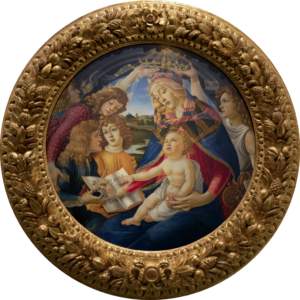Thoughts on Sunday’s Lessons for Dec. 24, 2017

The Madonna of the Magnificat (1481), tempera painting by Sandro Botticelli (1445-1510), in the Uffizi Gallery, Florence. (Click image to enlarge.)
“Once in Royal David’s City.” As we turn from Advent to Christmas overnight this year, our readings for the fourth and last Sunday of Advent trace the Messianic line of King David that Christians follow down the ages to Jesus. In the first reading, David muses that it seems wrong for him to rest comfortably in a palatial house of cedar while God’s house, the Ark of the Covenant, rests in a mere tent. The prophet Nathan agrees that God should have a fine house, a temple, but God has a different plan. God lives and moves with the people, and needs no house! God, rather, will establish the house of David, the dynasty of God’s people. We hear this echoed in Luke’s Gospel today, as the angel tells Mary that Jesus will inherit the throne of his ancestor David.”
Alternative to the Psalm: Luke 1:46-55 (Canticle 15)
For the second Sunday in a row, the Magnificat, the surprisingly radical Song of Mary, is available as an alternative to the usual Psalm. As we hear in today’s Gospel, the Angel Gabriel has told Mary that she will give birth to King David’s heir, the Messiah. When she feels the infant move in her womb during a visit to her relative, Elizabeth, who will soon give birth to John the Baptist, Mary rejoices in a poetic celebration that echoes the words of the prophets; thoughts that, perhaps, her son Jesus would hear from his mother: “He has cast down the mighty from their thrones, and has lifted up the lowly.”
Psalm: Psalm 89:1-4, 19-26
In harmony with our first reading, this Psalm portion celebrates God’s covenant with David and his descendants, a royal family that God established to last forever. Even through the devastation of war and the pain of exile, when Israel and Judah feared that God’s promise might have been revoked because the nation had broken its covenant by failing to be just and righteous, the Psalms sing of a new King David, a Messiah and King who would rule the land forever, “from the great sea to the river,” from the shores of the Mediterranean to the Jordan, the Galilee, and the Dead Sea..
Second Reading: Romans 16: 25-27
“Can’t we all just get along?” Throughout Paul’s powerful letter to the Romans, he gently encouraged Rome’s Gentile and Jewish Christian communities, who had been separated during the exile of Rome’s Jews, to come back together in Christian love and unify as one. Here, in ringing verses that conclude the letter, he reminds them that God’s covenant with the people in the First Testament, as expressed by the ancient prophets, now extends to all humanity, all living forever in glory through Jesus Christ.
Gospel: Luke 1: 26-38
As Advent ends on Christmas Eve this year, we hear Luke tell the familiar story of the Angel Gabriel’s visit to a young Palestinian woman named Mary. Through God’s Holy Spirit this young woman will give birth to a son named Jesus, who will inherit King David’s throne and rule over an eternal kingdom. She responds to this amazing news with simple, trusting acceptance: “Let it be with me according to your word.” Just a few verses later in Luke’s Gospel, she will go on to utter the liberating poetry of the Magnificat, the Song of Mary, celebrating the God who casts down the mighty, lifts up the lowly, feeds the hungry and sends the rich away empty.
